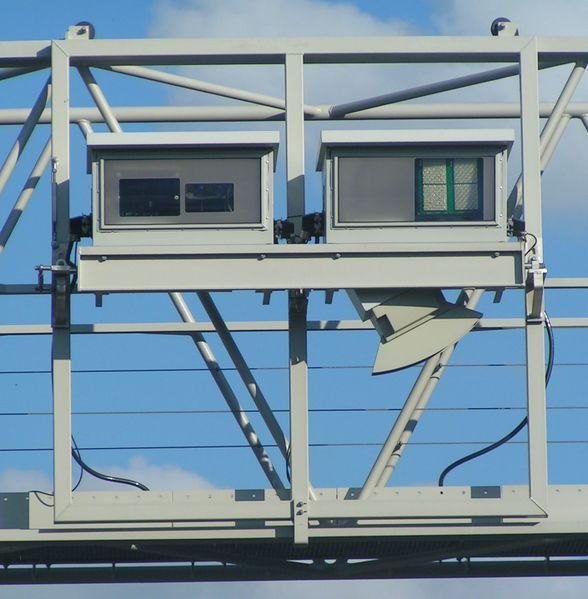Germany May Take Its Toll. Europe To Follow

As Americans have noted, bailouts can get costly. Europe has just decided on a trillion dollar bailout for their southern European deadbeats member states. Who’s going to pay for all that? In Germany, raising taxes is taboo (for the moment.) Lowering taxes had been one of the wedding vows of the ruling coalition. They didn’t say exactly when, but raising taxes would be politically – not very smart. So how else to raise money? Where else than from our darling piggy bank, the hapless motorist.
There are louder and louder voices in the ruling center-right coalition that demand a pay-per-kilometer road tax in Germany. Norbert Barthle, speaker for budget matters of the CDU/CSU said he will introduce such an idea. As far as the leadership goes, he’s preaching to the choir, reports Automobilwoche [sub]. Germany could implement the idea literally at the flick of a switch. Germany has a working network for a pay-per-kilometer road tax. Since 2005, toll is being collected from trucks only. The system is technology-heavy, with GPS boxes, and a dragnet of cameras that catches road tax scofflaws. It is operated by a private company called TollCollect. Behind it: Deutsche Telekom and Daimler. In 2007, the system collected €3.3b from trucks alone, €556m went to TollCollect. Imagine the take from cars! Daimler could use a little extra dough as well.
For years, the system has been eyed with suspicion by the common motorist. Now, the “if it’s there, it will be used” fears may come true.
Germany is not the only country in Europe that has to save and raise money. A European model for truck tolls has been discussed off and on. It would not surprise us if there will be European plans to shake more coin out of the unarmed motorist. Properly green washed, outfitted with words like “fair” and “just,” and bolstered by language along the lines of “why should drivers from [other country] drive for free on [our country’s] roads, which the [our country] taxpayer has paid,” the proposal will be waved through. If there is opposition, it will be blamed on bad, bad Brussels.

Bertel Schmitt comes back to journalism after taking a 35 year break in advertising and marketing. He ran and owned advertising agencies in Duesseldorf, Germany, and New York City. Volkswagen A.G. was Bertel's most important corporate account. Schmitt's advertising and marketing career touched many corners of the industry with a special focus on automotive products and services. Since 2004, he lives in Japan and China with his wife <a href="http://www.tomokoandbertel.com"> Tomoko </a>. Bertel Schmitt is a founding board member of the <a href="http://www.offshoresuperseries.com"> Offshore Super Series </a>, an American offshore powerboat racing organization. He is co-owner of the racing team Typhoon.
More by Bertel Schmitt
Latest Car Reviews
Read moreLatest Product Reviews
Read moreRecent Comments
- Jalop1991 In a manner similar to PHEV being the correct answer, I declare RPVs to be the correct answer here.We're doing it with certain aircraft; why not with cars on the ground, using hardware and tools like Telsa's "FSD" or GM's "SuperCruise" as the base?Take the local Uber driver out of the car, and put him in a professional centralized environment from where he drives me around. The system and the individual car can have awareness as well as gates, but he's responsible for the driving.Put the tech into my car, and let me buy it as needed. I need someone else to drive me home; hit the button and voila, I've hired a driver for the moment. I don't want to drive 11 hours to my vacation spot; hire the remote pilot for that. When I get there, I have my car and he's still at his normal location, piloting cars for other people.The system would allow for driver rest period, like what's required for truckers, so I might end up with multiple people driving me to the coast. I don't care. And they don't have to be physically with me, therefore they can be way cheaper.Charge taxi-type per-mile rates. For long drives, offer per-trip rates. Offer subscriptions, including miles/hours. Whatever.(And for grins, dress the remote pilots all as Johnnie.)Start this out with big rigs. Take the trucker away from the long haul driving, and let him be there for emergencies and the short haul parts of the trip.And in a manner similar to PHEVs being discredited, I fully expect to be razzed for this brilliant idea (not unlike how Alan Kay wasn't recognized until many many years later for his Dynabook vision).
- B-BodyBuick84 Not afraid of AV's as I highly doubt they will ever be %100 viable for our roads. Stop-and-go downtown city or rush hour highway traffic? I can see that, but otherwise there's simply too many variables. Bad weather conditions, faded road lines or markings, reflective surfaces with glare, etc. There's also the issue of cultural norms. About a decade ago there was actually an online test called 'The Morality Machine' one could do online where you were in control of an AV and choose what action to take when a crash was inevitable. I think something like 2.5 million people across the world participated? For example, do you hit and most likely kill the elderly couple strolling across the crosswalk or crash the vehicle into a cement barrier and almost certainly cause the death of the vehicle occupants? What if it's a parent and child? In N. America 98% of people choose to hit the elderly couple and save themselves while in Asia, the exact opposite happened where 98% choose to hit the parent and child. Why? Cultural differences. Asia puts a lot of emphasis on respecting their elderly while N. America has a culture of 'save/ protect the children'. Are these AV's going to respect that culture? Is a VW Jetta or Buick Envision AV going to have different programming depending on whether it's sold in Canada or Taiwan? how's that going to effect legislation and legal battles when a crash inevitibly does happen? These are the true barriers to mass AV adoption, and in the 10 years since that test came out, there has been zero answers or progress on this matter. So no, I'm not afraid of AV's simply because with the exception of a few specific situations, most avenues are going to prove to be a dead-end for automakers.
- Mike Bradley Autonomous cars were developed in Silicon Valley. For new products there, the standard business plan is to put a barely-functioning product on the market right away and wait for the early-adopter customers to find the flaws. That's exactly what's happened. Detroit's plan is pretty much the opposite, but Detroit isn't developing this product. That's why dealers, for instance, haven't been trained in the cars.
- Dartman https://apnews.com/article/artificial-intelligence-fighter-jets-air-force-6a1100c96a73ca9b7f41cbd6a2753fdaAutonomous/Ai is here now. The question is implementation and acceptance.
- FreedMike If Dodge were smart - and I don't think they are - they'd spend their money refreshing and reworking the Durango (which I think is entering model year 3,221), versus going down the same "stuff 'em full of motor and give 'em cool new paint options" path. That's the approach they used with the Charger and Challenger, and both those models are dead. The Durango is still a strong product in a strong market; why not keep it fresher?


































Comments
Join the conversation
And once again, as usual, the normal citizen has to pay for the poor management of the politicians.
Of course, a pay-per-kilometer road tax is the wet dream of each and every politician in debt-ridden countries. Makes them independent from declining fuel consumption and gives them additional room for wasting money. Once established, they will be able to "adjust" it every year according to their needs. If combined with a "financial transaction tax" public wasting can go on for a while. Europe/Germany will show that you can have it all: high fuel prices plus toll roads plus high taxes. That will save the planet and your local politician.